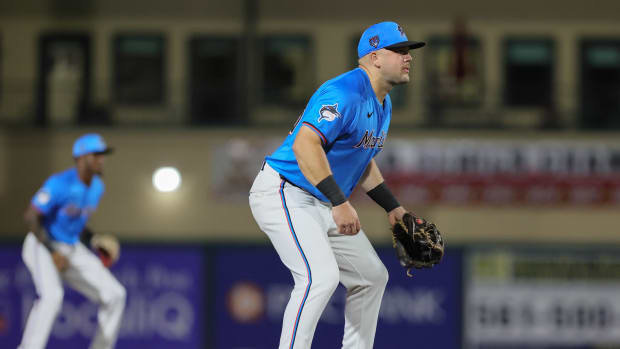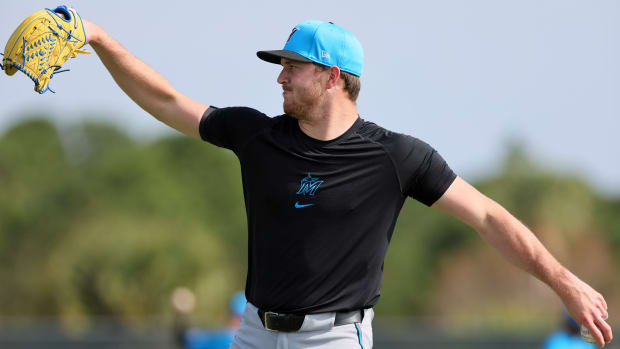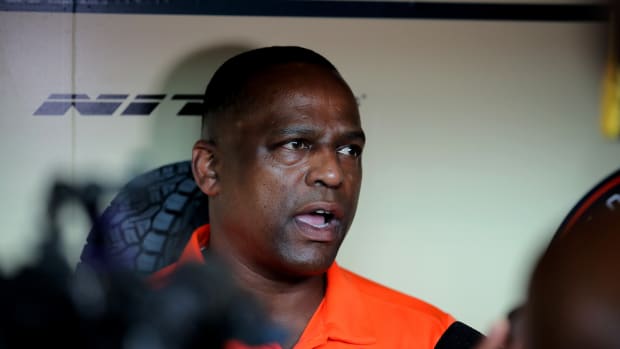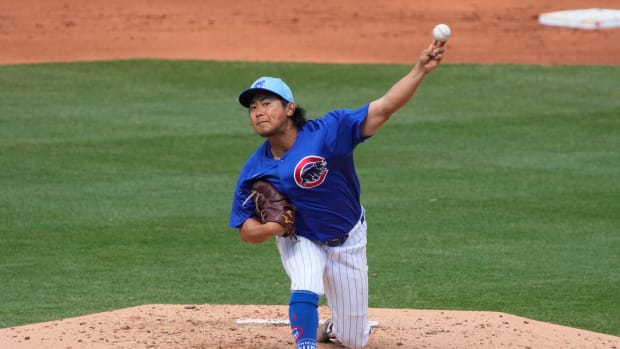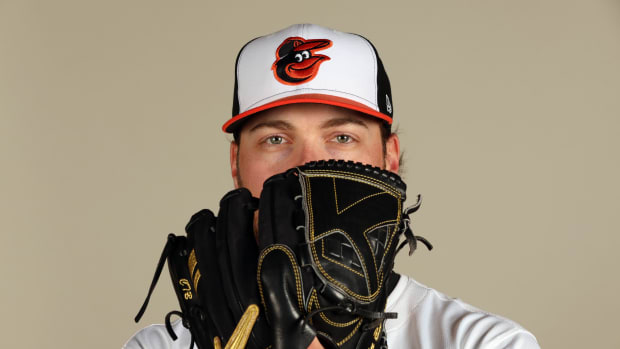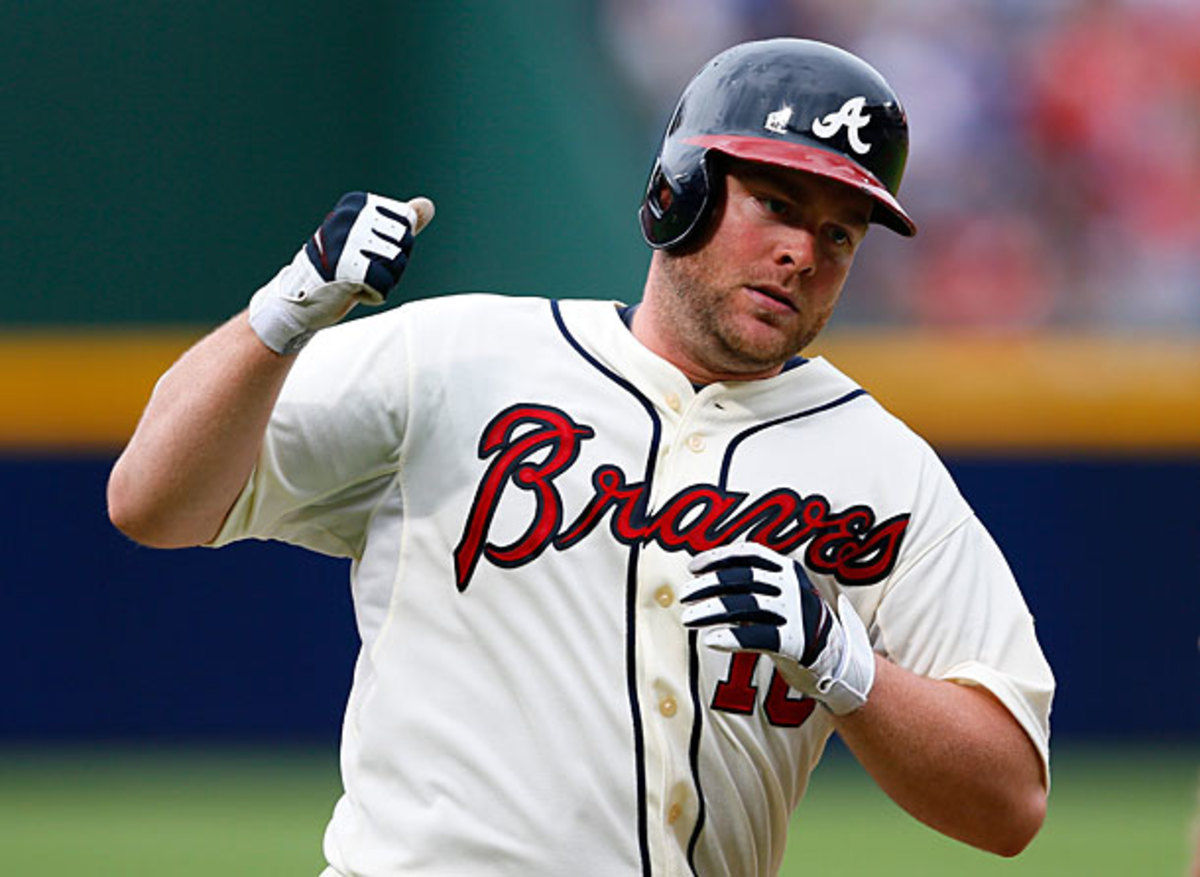
Yankees sign Brian McCann to five-year, $85 million deal
Brian McCann went to his seventh All-Star Game in 2013 with the Atlanta Braves. (Kevin C. Cox/Getty Images)
When the free-agency period began, one signing everyone promised would happen was the Yankees grabbing catcher Brian McCann. The prospective deal made sense for both sides: The Yankees needed a catcher for 2013 and beyond and had a lot of money to throw at that problem, and McCann needed a new team and presumably likes money. And so the prediction has come to pass, as New York signed the former Brave to a five-year, $85 million deal Saturday. The agreement—which includes a vesting option for a sixth year that bumps the total package up to $100 million and has a full no-trade clause—makes McCann the highest paid catcher in all of baseball and helps the Yankees shore up a position that was, to put it charitably, a complete and utter disaster last season.
McCann, a Georgia native and second-round draft pick out of high school by Atlanta in 2002, has spent all nine seasons of his major-league career with the Braves. McCann rocketed through the minor leagues, debuting with the Braves in June of 2005 at the tender age of 21, then burst onto the scene in his sophomore season, posting a career-best .333/.388/.572 line with 24 homers, 93 RBI and an OPS+ of 143 over 492 plate appearances. Though he slipped to a .772 OPS in 2007, he rebounded with another sterling line of .301/.373/.523 in 2008, and posted an OPS of .800 or better for the next three seasons.
An oblique injury suffered in 2011, however, led to McCann changing his approach at the plate to be more of a pull hitter. Combined with a right shoulder injury that turned out to be a torn labrum, McCann struggled through a 2012 season that saw him post career lows in virtually every offensive category. McCann underwent surgery on the shoulder after the season finished, a procedure that cost him the first five weeks of 2013, but the veteran catcher rebounded with a .256/.336/.461 triple slash more in line with his career averages.
At a glance, McCann's 2013 stats don't reveal any major issues. The low average and on-base percentage were likely the result of bad luck on balls in play (.261 BABIP despite a line-drive percentage of 22.3), while his power numbers were closer to his heyday than his poor 2012. If there is one concern, though, it's McCann's performance against fastballs. From 2007 through 2011, McCann hit a robust .281 with a .483 slugging percentage, .202 isolated power and .295 BABIP on four-seamers. Since then, though, those numbers have dropped considerably. In his injury-plagued 2012, McCann hit only .248/.438 against four-seamers, then followed that up with a .228/.404 line in 2013. Stats show a hitter who was persistently late on fastballs all season, routinely popping them up.
As a lefthander, McCann has also had increasing problems with southpaws. Last season, McCann managed a paltry .231/.279/.337 line against lefties, striking out 22 times versus just four walks and three home runs. That's down from a .673 OPS in 2012 and a .794 mark in 2011. In fact, it's just the second time in McCann's career as a full-time player that he's had an OPS under .650 against left-handers, joining 2009. Again, it was the fastball that gave McCann the most trouble against left-handers, with a .191 average and .262 slugging percentage against four-seamers from lefties last season.
The Yankees have to hope that McCann's problems with heaters and left-handers can be reversed. After all, it's McCann's left-handed power stroke that made him such an attractive option to New York, with the short porch in right field at Yankee Stadium seemingly tailor-made for McCann. With 81 games in Yankee Stadium, as well as the friendlier hitting environs of the American League, it's a safe bet that McCann will eclipse his career-high in home runs (24) without too much trouble.
Problems or not, the Yankees seemingly had little other recourse than to give McCann a giant pile of cash. Last season was a mess for the Yankees behind the plate, with a cast of rookies and cast-off veterans amassing a brutal .213/.289/.298 line at catcher. That .587 OPS was the fifth-worst in all of baseball last season at catcher, and only the Miami Marlins got less power out of the position than the Yankees. The biggest culprits in the catcher disaster were well-traveled veteran Chris Stewart (.211/.293/.272 in 340 plate appearances) and Austin Romine (.207/.255/.296 in 148 PAs), both of whom were pressed into active duty when a fractured hand and a steroids suspension cut short ostensible starter Francisco Cervelli's season after just 17 games.
The Yankees did have a backup plan of sorts in their farm system in the form of top prospect Gary Sanchez, who posted a .744 OPS at age 20 in Double-A Trenton last season. But Sanchez's defense is still apparently a work in progress, and the Yankees likely want him to master Double-A pitching before entertaining thoughts of big-league games, which puts him out of New York's plans until at least 2015. Faced with the prospect of once again turning to the Cerberus of suck that was Stewart, Romine and Cervelli, the Yankees had almost no choice but to bring in McCann.
Nonetheless, the five-year deal represents some serious risk on the Yankees' part, given how hard McCann was worked in Atlanta. As a Brave, McCann caught 1,046 games, becoming only the 26th player in major-league history to catch over 1,000 games by the age of 30. Few of those players remained productive past that point. Catchers like Ted Simmons (1,557 games by the time he turned 30), Gary Carter (1,407), Jason Kendall (1,252) and Lance Parrish (1,146) all saw their offensive output plummet post 30. Others went from heavy starter workloads to primarily backup work within a few years of passing 30. Tim McCarver was no longer a regular starter by 31; Yogi Berra was more or less done as a full-time catcher by 34; Mike Scioscia retired at 33. The Braves certainly got their money's worth from McCann, but it's far from certain that the Yankees will.
The key, then, will be the progress of Sanchez. If he can keep climbing up the ranks at a good pace and emerge as a viable starter talent by 2015 or '16, he'll provide a cheap and valuable fall-back option should McCann succumb to the ravages of time. But if he stalls out or busts like fellow former Yankees catching prospect Jesus Montero, New York will be in the unenviable position of hoping a catcher in his 30s making $17 million a year can beat the odds and remain productive.
For the immediate future, however, McCann should be a huge boost to the Yankees. His power, defense and pitch-calling should all be marked improvements over last season's dreck, and his contract won't cripple New York when it comes to other signings. He's unlikely to be the three- or four-win player he was in his prime with Atlanta, but he'll be a sizable upgrade for a team that can't afford another non-contending season.
As for Atlanta, the Braves will likely go forward at catcher with some combination of Evan Gattis, top prospect Christian Bethancourt and veteran backup Gerald Laird. Whether the Braves will try to add any other pieces to that group remains to be seen. McCann's departure also nets the Braves a compensatory draft pick as a result of the qualifying offer he turned down, while the Yankees lose their first-round pick.
Jarrod Saltalamacchia































